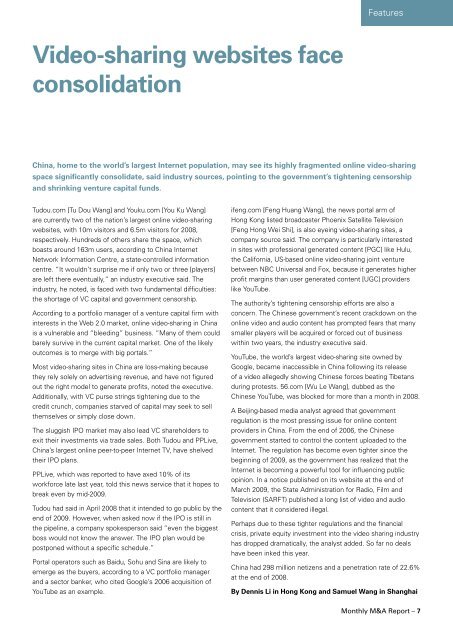Monthly M&A Insider - Mergermarket
Monthly M&A Insider - Mergermarket
Monthly M&A Insider - Mergermarket
Create successful ePaper yourself
Turn your PDF publications into a flip-book with our unique Google optimized e-Paper software.
Video-sharing websites face<br />
consolidation<br />
Features<br />
China, home to the world’s largest Internet population, may see its highly fragmented online video-sharing<br />
space significantly consolidate, said industry sources, pointing to the government’s tightening censorship<br />
and shrinking venture capital funds.<br />
Tudou.com [Tu Dou Wang] and Youku.com [You Ku Wang]<br />
are currently two of the nation’s largest online video-sharing<br />
websites, with 10m visitors and 6.5m visitors for 2008,<br />
respectively. Hundreds of others share the space, which<br />
boasts around 163m users, according to China Internet<br />
Network Information Centre, a state-controlled information<br />
centre. “It wouldn’t surprise me if only two or three [players]<br />
are left there eventually,” an industry executive said. The<br />
industry, he noted, is faced with two fundamental difficulties:<br />
the shortage of VC capital and government censorship.<br />
According to a portfolio manager of a venture capital firm with<br />
interests in the Web 2.0 market, online video-sharing in China<br />
is a vulnerable and “bleeding” business. “Many of them could<br />
barely survive in the current capital market. One of the likely<br />
outcomes is to merge with big portals.”<br />
Most video-sharing sites in China are loss-making because<br />
they rely solely on advertising revenue, and have not figured<br />
out the right model to generate profits, noted the executive.<br />
Additionally, with VC purse strings tightening due to the<br />
credit crunch, companies starved of capital may seek to sell<br />
themselves or simply close down.<br />
The sluggish IPO market may also lead VC shareholders to<br />
exit their investments via trade sales. Both Tudou and PPLive,<br />
China’s largest online peer-to-peer Internet TV, have shelved<br />
their IPO plans.<br />
PPLive, which was reported to have axed 10% of its<br />
workforce late last year, told this news service that it hopes to<br />
break even by mid-2009.<br />
Tudou had said in April 2008 that it intended to go public by the<br />
end of 2009. However, when asked now if the IPO is still in<br />
the pipeline, a company spokesperson said “even the biggest<br />
boss would not know the answer. The IPO plan would be<br />
postponed without a specific schedule.”<br />
Portal operators such as Baidu, Sohu and Sina are likely to<br />
emerge as the buyers, according to a VC portfolio manager<br />
and a sector banker, who cited Google’s 2006 acquisition of<br />
YouTube as an example.<br />
ifeng.com [Feng Huang Wang], the news portal arm of<br />
Hong Kong listed broadcaster Phoenix Satellite Television<br />
[Feng Hong Wei Shi], is also eyeing video-sharing sites, a<br />
company source said. The company is particularly interested<br />
in sites with professional generated content [PGC] like Hulu,<br />
the California, US-based online video-sharing joint venture<br />
between NBC Universal and Fox, because it generates higher<br />
profit margins than user generated content [UGC] providers<br />
like YouTube.<br />
The authority’s tightening censorship efforts are also a<br />
concern. The Chinese government’s recent crackdown on the<br />
online video and audio content has prompted fears that many<br />
smaller players will be acquired or forced out of business<br />
within two years, the industry executive said.<br />
YouTube, the world’s largest video-sharing site owned by<br />
Google, became inaccessible in China following its release<br />
of a video allegedly showing Chinese forces beating Tibetans<br />
during protests. 56.com [Wu Le Wang], dubbed as the<br />
Chinese YouTube, was blocked for more than a month in 2008.<br />
A Beijing-based media analyst agreed that government<br />
regulation is the most pressing issue for online content<br />
providers in China. From the end of 2006, the Chinese<br />
government started to control the content uploaded to the<br />
Internet. The regulation has become even tighter since the<br />
beginning of 2009, as the government has realized that the<br />
Internet is becoming a powerful tool for influencing public<br />
opinion. In a notice published on its website at the end of<br />
March 2009, the State Administration for Radio, Film and<br />
Television (SARFT) published a long list of video and audio<br />
content that it considered illegal.<br />
Perhaps due to these tighter regulations and the financial<br />
crisis, private equity investment into the video sharing industry<br />
has dropped dramatically, the analyst added. So far no deals<br />
have been inked this year.<br />
China had 298 million netizens and a penetration rate of 22.6%<br />
at the end of 2008.<br />
By Dennis Li in Hong Kong and Samuel Wang in Shanghai<br />
<strong>Monthly</strong> M&A Report – 7




![mergermarket [TITLE OF RELEASE TO GO HERE] 3 January 2013 ...](https://img.yumpu.com/11701841/1/190x135/mergermarket-title-of-release-to-go-here-3-january-2013-.jpg?quality=85)












